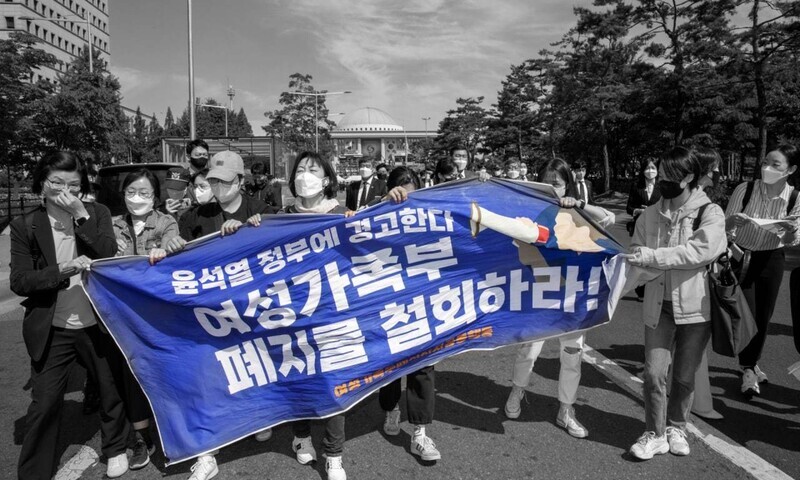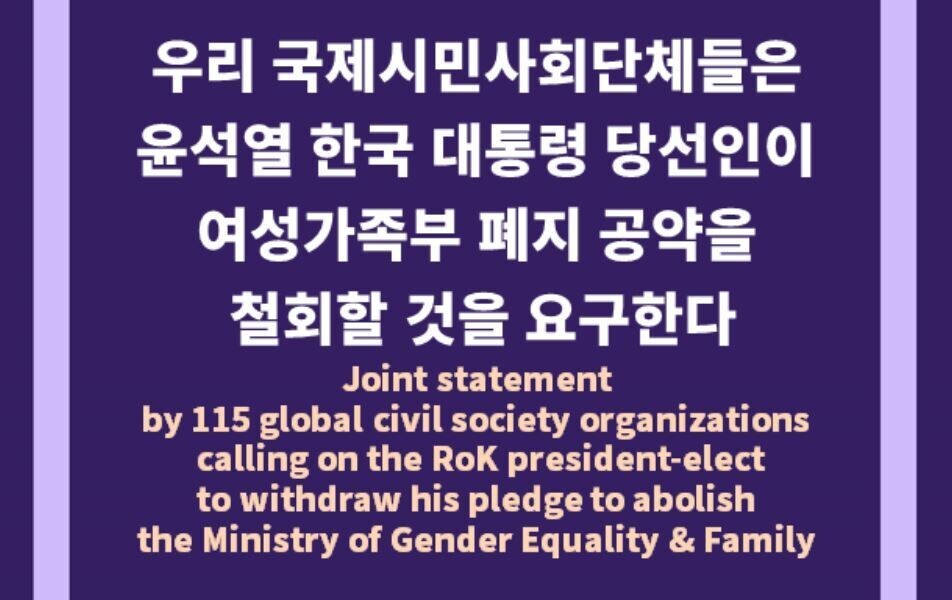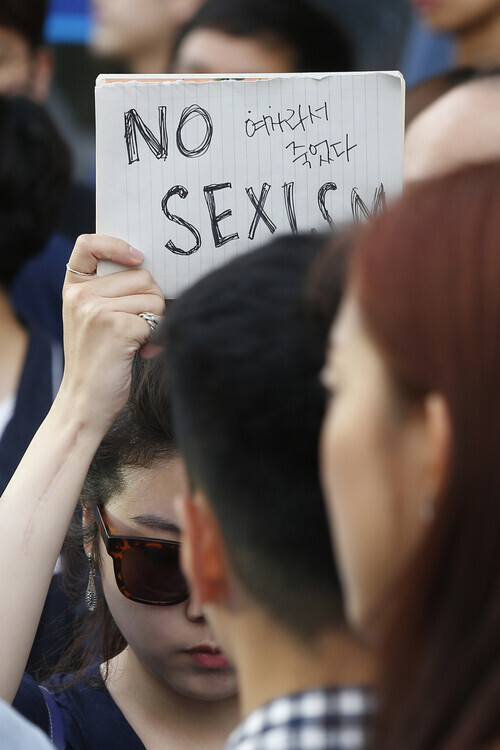hankyoreh
Links to other country sites 다른 나라 사이트 링크
Weight of words: S. Korean women confront impact of calls to abolish Gender Equality Ministry

Editor’s note: The South Korean Ministry of Gender Equality and Family, which has been the cornerstone of the state’s gender equality regime for more than two decades since its establishment in 2001, has been constantly undermined by politicians’ remarks.
After the slogan about shutting down the ministry became a pithy catchphrase for politicians, the idea took root in the sphere of public discourse. In the end, it was adopted as one of Yoon Suk-yeol’s pledges in his presidential campaign.
Yet the ministry is still here. The ministry can only be abolished by a revision to the Government Organization Act, which isn’t likely to happen anytime soon considering the opposition Democratic Party’s majority in the National Assembly.
While the ministry remains, the calls to shut it down have had a big impact, triggering a backlash from various parts of Korean society over the past year. The Hankyoreh has tracked trends in the government and consulted people on the ground to see how the slogan has impacted the educational community, the investigating authorities, victims, and the groups that support them.
In the past year, the argument that the Ministry of Gender Equality and Family (MOGEF) should be abolished has had a far-reaching effect beyond the question of whether the ministry should continue to exist, influencing an extensive array of fields in distinct ways. Policies and systems for gender equality have continuously withered away and regressed in various aspects.
The Hankyoreh spoke to 18 individuals, including gender equality educational activists, teachers, and those working for investigative agencies, sexual assault victim support groups, and organizations that are affiliated or have partnered with the MOGEF, all of whom attested that since calls to abolish the MOGEF came to the fore of political discourse last July, they have been feeling an increasing sense of discouragement.
Apprehension spreads to affiliated organizationsOrganizations and groups that work together with the MOGEF to protect and support sexual assault victims are desperate for an expansion of the ministry’s functions. However, considering the current state of political discourse, officials at these organizations and groups explained that it has become much more difficult for them to ask the ministry to play a more proactive role in tackling the issues they work on.
“Two years ago, when the Act on the Protection of Children and Youth against Sex Offenses was revised, the MOGEF provided assistance by persuading the Ministry of Justice, which opposed the revisions to the bill, and acting as a mediator,” said Lee Ha-young, the president of the National Solidarity Against Sexual Exploitation of Women. Lee’s group has focused its activities on bringing about the removal of the legal clause stipulating the punishment of female sex workers and advocating for the revision of the Act on the Prevention of Commercial Sex Acts and Protection of Victims so that demand for commercial sex itself is stamped out.
Lee continued, “But now that the ministry is engulfed in discourse in favor of its eradication, it’s become harder to expect it to play a proactive role as it did in the past.”
The push for the MOGEF’s dissolution has had an even more direct effect on victims. “A,” an activist at the Advocacy Center for Online Sexual Abuse Victims at the Women’s Human Rights Institute, an organization affiliated with the MOGEF, said, “Because we’re so short-staffed, victims who have been harmed by illegal videos or photos containing their faces or capturing their everyday lives are being pushed to the back of the line for support [to remove illegal videos and photos from the internet].”
The center’s budget and staffing for this year were determined by the previous administration, but it’s unclear whether the current administration will strengthen its support for the center, considering it set the tone for the scrapping of the MOGEF.
Some crisis intervention centers for women and children, which are operated through the cooperation of the MOGEF, local governments, medical institutions, and the police, are facing difficulties as well. This is because even though they are products of quadrilateral cooperation, they rely on the MOGEF for their budget and other major operational support.
“B,” who works at a regional crisis intervention center, said, “The pay is low to begin with, and because of the added factor that abolishing the MOGEF has entered popular political discourse, even when we post job openings, nobody applies. Some people even call to ask whether the crisis intervention center will continue to exist.”

Interviewees also projected that the argument that efforts to uncover and punish libel in the form of false accusations of sexual assault or harassment should be strengthened — which has been raised hand in hand with the argument for the abolition of the MOGEF — will have a negative effect on victim support groups as well as investigative agencies.
“B” said, “Before the debate surrounding false accusations, victims asked, ‘Will my assailant be punished?’ But now, they ask, ‘Is there a possibility that I might be countered with a false accusation charge?’” They added, “People who are worried that society will not acknowledge that they were sexually assaulted end up stop coming to our center [for support].”
Lee also said, “Even as activists, we aren’t able to actively encourage victims to pursue punishment for their assailants because of concerns that counselees might be hurt as the case progresses and in case investigations might not be properly carried out.”
In fact, according to a tally by the National Council of Sexual Violence Relief Centers, the total number of consultations concerning false accusations provided by 45 sexual violence relief centers across South Korea in 2021 was 404, a 91% jump from the 211 consultations provided in 2020, which had been a significant drop from the figure in 2018, which was 531.
After the #MeToo movement in 2018, the Supreme Prosecutors’ Office revised its investigation manual, adding the recommendation that investigations into false accusation charges not be opened before charges of sexual violation were fully looked into. Plus, the Framework Act on Prevention of Violence against Women went into effect in December 2019, establishing the grounds on which victims could raise complaints regarding secondary victimization at the hands of investigative agencies.
These factors had led to a consistent decrease in consultations concerning false accusation charges, but their number rebounded last year. Consultations on the topic have already numbered 150 as of April this year.
Unlike the scrapping of the MOGEF, the Yoon Suk-yeol administration officially designated the strengthening of efforts to uncover and punish false accusations as a national policy initiative. Members of the police worried that this would shift the focus of investigations onto false accusation cases and discourage victims from reporting sexual assault and harassment to the authorities.
“C,” a current police officer, said, “Saying more efforts will be made to ‘uncover’ false accusations means that proactive investigations into such cases will be expanded, not that there will be more charges and reports. I’m concerned that the police response to gender-based crimes will weaken overall.”
“D,” another current police officer, said, “Considering past cases, something being set as a national policy initiative means it will very likely be coupled with ‘performance scores.’ In other words, proactive investigations into charges of false accusations may be regarded as performance. Until now, the police made efforts not to revictimize victims during the investigation process for sexual violence cases, but I’m worried that efforts will be refocused on cracking down on false accusations from now on.”

The argument that the MOGEF should be abolished has gone so far as to destabilize the standing of gender equality education in the classroom. Lee Han, a gender equality educational activist, said, “Since President Yoon Suk-yeol formally declared the scrapping of the MOGEF during his campaign, simply citing MOGEF material prompts student comments like, ‘Isn’t the MOGEF being abolished?’; ‘Why isn’t there a Ministry of Male Equality and Family?’; and ‘Politicians must be saying the MOGEF should be dissolved because the MOGEF did something wrong.’”
Some say that the argument in favor of the MOGEF’s eradication, which was mainly bolstered and repeated by politicians in the People Power Party, functioned as a go-ahead for people to publicly express discriminatory viewpoints.
“E,” an elementary school teacher, said, “Even in situations that have nothing to do with the scrapping of the MOGEF — for example, if [I, a female teacher], drop a paintbrush during art class by accident — male students will say, ‘This is why the MOGEF should be abolished,’ like it’s some kind of catch phrase or meme. Because of this, when I’m coming up with examples to use during class, I become self-conscious about how students could respond without meaning to and end up avoiding the issue of gender equality.”
By Choi Yoon-ah, staff reporter; Park Go-eun, staff reporter; Yi Ju-been, staff reporter
Please direct questions or comments to [english@hani.co.kr]

Editorial・opinion
![[Column] Has Korea, too, crossed the Rubicon on China? [Column] Has Korea, too, crossed the Rubicon on China?](https://flexible.img.hani.co.kr/flexible/normal/500/300/imgdb/original/2024/0419/9317135153409185.jpg) [Column] Has Korea, too, crossed the Rubicon on China?
[Column] Has Korea, too, crossed the Rubicon on China?![[Correspondent’s column] In Japan’s alliance with US, echoes of its past alliances with UK [Correspondent’s column] In Japan’s alliance with US, echoes of its past alliances with UK](https://flexible.img.hani.co.kr/flexible/normal/500/300/imgdb/original/2024/0419/2317135166563519.jpg) [Correspondent’s column] In Japan’s alliance with US, echoes of its past alliances with UK
[Correspondent’s column] In Japan’s alliance with US, echoes of its past alliances with UK- [Editorial] Does Yoon think the Korean public is wrong?
- [Editorial] As it bolsters its alliance with US, Japan must be accountable for past
- [Guest essay] Amending the Constitution is Yoon’s key to leaving office in public’s good graces
- [Editorial] 10 years on, lessons of Sewol tragedy must never be forgotten
- [Column] A death blow to Korea’s prosecutor politics
- [Correspondent’s column] The US and the end of Japanese pacifism
- [Guest essay] How Korea turned its trainee doctors into monsters
- [Guest essay] As someone who helped forge Seoul-Moscow ties, their status today troubles me
Most viewed articles
- 1[Column] The clock is ticking for Korea’s first lady
- 2After 2 months of delayed, denied medical care, Koreans worry worst may be yet to come
- 3US overtakes China as Korea’s top export market, prompting trade sanction jitters
- 4[Column] Has Korea, too, crossed the Rubicon on China?
- 5[Correspondent’s column] In Japan’s alliance with US, echoes of its past alliances with UK
- 6Hong Se-hwa, voice for tolerance whose memoir of exile touched a chord, dies at 76
- 7[Editorial] When the choice is kids or career, Korea will never overcome birth rate woes
- 8Samsung barricades office as unionized workers strike for better conditions
- 9All eyes on Xiaomi after it pulls off EV that Apple couldn’t
- 10More South Koreans, particularly the young, are leaving their religions